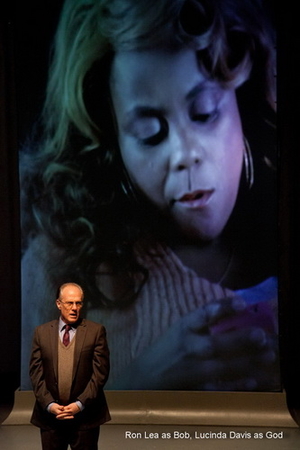Lucinda Davis is God in the Centaur Theatre’s existential drama The Book of Bob, and she’s divine.
The premiere of Arthur Holden’s updated interpretation of the strained Old Testament parable, The Book of Job, running until March 2, is a toute de force for Davis who is an astonishing presence throughout the 90 minute show. If, as scripture insists, we are created in the image of God, Davis seizes the conceit and infuses ten different characters with her phenomenal talent.
The play is about a “perfect but upright,” McGill University professor who, unlike the biblical Job, doesn’t believe in God even when God arrives, first, as an irritating student who undermines his Dostoevsky lecture then proceeds to wreak havoc with his life. This God appears and disappears throughout the evening like a fragmented nightmare. The fundamental problem with the script, of course, is if you don’t have faith how can that faith be tested; how can you abandon what you don’t have?
Ron Lea as the tweedy, middle-aged atheist who is subjected to the suffering is a standout. But even with his crusty demeanour and authoritative voice, Lea is no match for God. He discovers his son is a drug dealer, his wife is diagnosed with colon cancer then his father commits suicide (just as the playwright’s celebrated father, lawyer, MNA and boulevardier, Richard Holden did eight years ago). So, under stress this modern day Job we are told, “hopes to deserve forgiveness in time.”
Ellen David’s has made a flawless directorial debut at the Centaur. The multi-media concept strengthens the perhaps overly-literate script. Benoit Beaulieu’s cinematography, Patrick Andrew Boivin and George Allister’s video design and James Lavoie’s set and costumes are, quite frankly, a miracle.
 In spite of its admirable production values there is an unsettling edge to the evening. The script is often more psycho-babble than theological. What’s missing is a resolution. The moral issues in the Book of Job are black and white; the Book of Bob trivializes scripture. It has an ambiguous, humanist , take-it-or -leave it ending. Bob, we are told wasn’t, in spite of his suffering, inspired to make changes. “ He didn’t form a resolution to lead a better life, he was just the same old Bob. But unhappier. But unhappiness too, in the right amount at the right time,” we are assured, “ can begin the process, the life long process of setting a person free.”
In spite of its admirable production values there is an unsettling edge to the evening. The script is often more psycho-babble than theological. What’s missing is a resolution. The moral issues in the Book of Job are black and white; the Book of Bob trivializes scripture. It has an ambiguous, humanist , take-it-or -leave it ending. Bob, we are told wasn’t, in spite of his suffering, inspired to make changes. “ He didn’t form a resolution to lead a better life, he was just the same old Bob. But unhappier. But unhappiness too, in the right amount at the right time,” we are assured, “ can begin the process, the life long process of setting a person free.”
Bob is chastened a bit and seeks professional therapy. Apparently the moral of the play is that if the people we cry out to in our misery offer a little kindness, then perhaps some good will come of it. Unlike the Biblical Job who swears by God in spite of the pain he has endured, this Bob just swears.

























Commentaires
Veuillez vous connecter pour poster des commentaires.